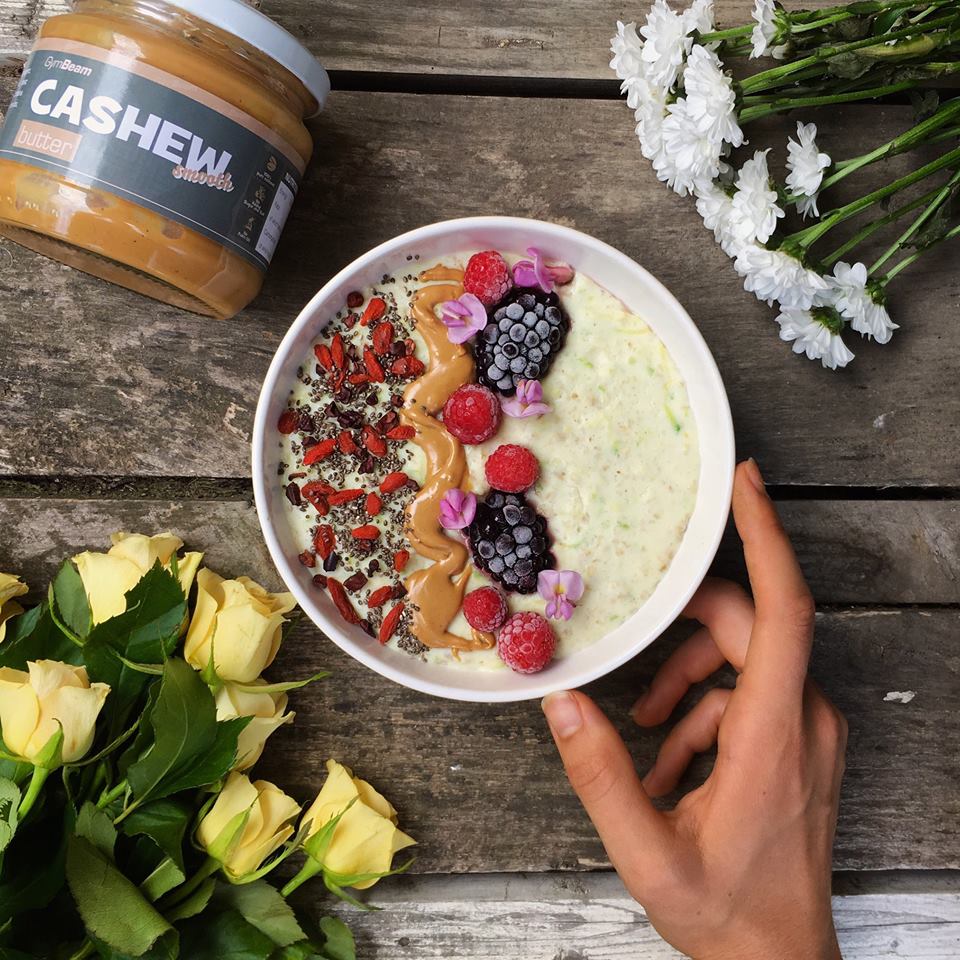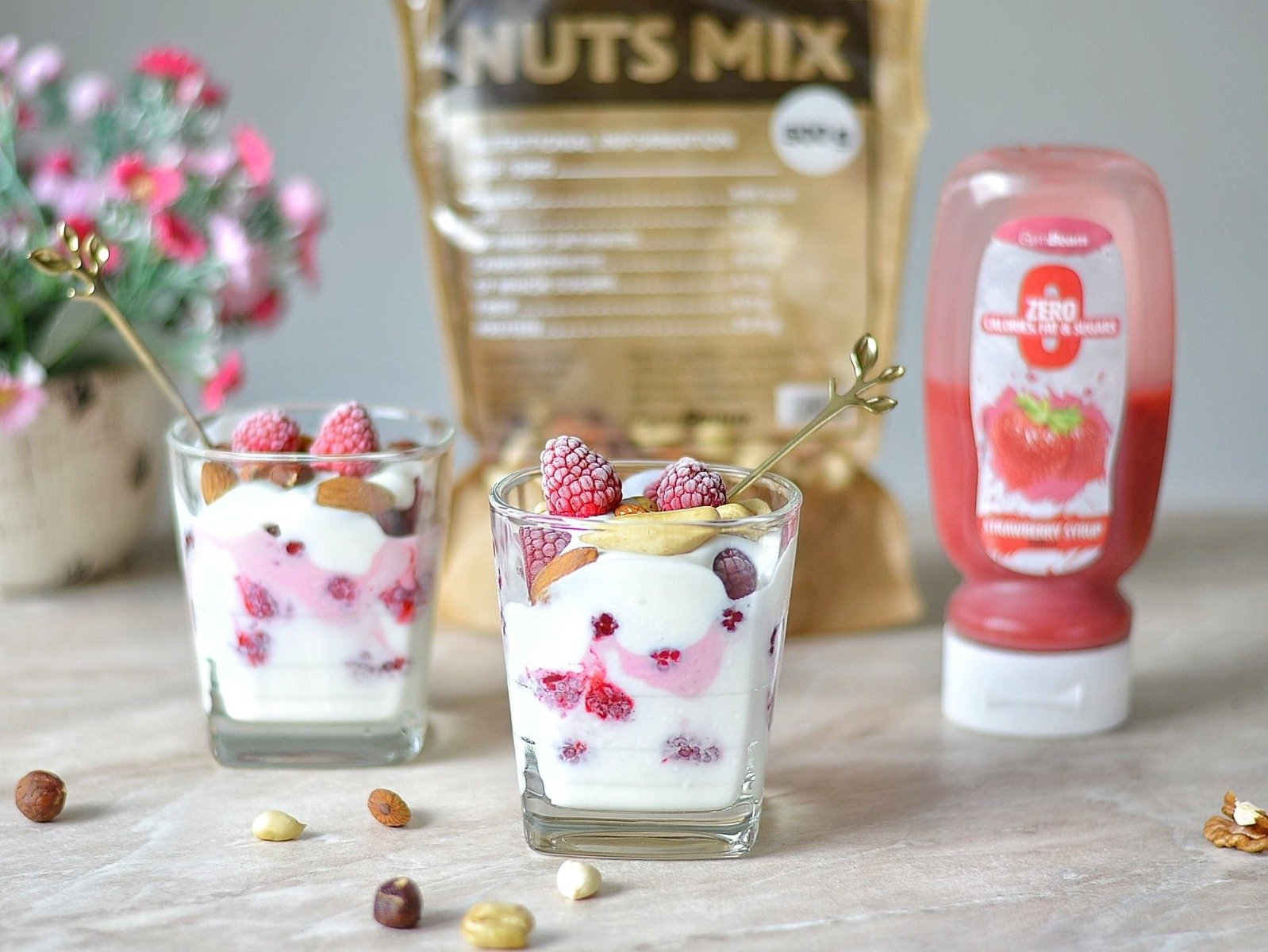Table of Contents
Do you belong to people who take the morning training to have enough time for other activities in the afternoon? Also, when you get out of bed, do you wear leggings and tie up sneakers first? In that case, this article is just for you. You will find out whether breakfast is necessary before the morning workout, and what experts say about the diet before exercise. We will also reveal what should include food before training and what supplements boost you with energy and essential nutrients. In addition, we will provide you with a few tips on how your pre-training breakfast could look like.
Breakfast before training – yes or no?
Does it happen that you can eat nothing before exercise? We believe that eating early in the morning may even make you uncomfortable. A number of dietary and fitness experts are as follows: if you are not hungry early in the morning and have the energy, you should not be forced to eat before training. Although it is still true that experts recommend eating breakfast before exercise. But if you feel tired in the morning, it is necessary to choose the right diet. [1]

You might be interested in these products:
How to choose a meal before training?
When choosing an early breakfast, it is important to think about how much time you need to digest your meal. In general, you should eat at least 90 minutes before training. But, if you get up very early, you certainly don’t want to get up even another 90 minutes earlier just to eat. It’s okay, there is a lot of fast digestible breakfasts that you can eat without having to get up earlier. [1]
The choice of food before training also depends on the activity you choose to do. Lower intensity physical activity also does not require a rich breakfast like strength sports. Sports activities such as cardio (running, cycling, swimming) or strength training or exercise with high repetitions such as gymnastics or martial arts require sufficient fuel in the form of a diet. If you do not have the energy, your body will react slowly, or you will feel more tired. It is even possible that you will not have the power to exercise as long or as fast as usual. [2]
The body simply needs nutrients. It needs a power source, a fuel that will drive you for better performance. If you do not have much time to digest, try to eat just reduced portion of food you consume regularly. For example, if you get used to eating Greek yogurt with banana and nut butter, just have white yoghurt before your morning workout. How should the ideal composition of your breakfast look like? We’ll explain it in the following lines.

Nutritional diet composition before morning training
Estimating the right portion of breakfast can be challenging. If you eat too much, your stomach will demonstrate it during your workout. On the other hand, if you eat too little food, you will endanger your performance and you will not be able to exercise at full power. [3] So what should your breakfast before training include?

1. Proteins
Your first choice should be proteins. Why? Three hours after eating a protein-rich meal, the body gets into a negative protein balance. This means your body is exposed to catabolism after 8 hours of sleep. Preventing this condition is simple. Just add protein together with BCAA amino acids that directly stimulate muscle building and help with muscle regeneration. [3]
Any source of protein, such as egg whites, chicken breast or Greek yogurt is appropriate. If you want something lighter and more readily absorbable, reach out for the whey protein or BCAA supplement to minimize the risk of stomach problems during training. Regardless of the protein source, however, consider taking at least 2-3 g of leucine. Leucine is an essential amino acid that is part of the BCAA and is responsible for the growth of muscle mass. [4]
2. Carbohydrates
Carbohydrates are your primary source of energy for your muscles, so they should not be missing in your breakfast before training. In fact, carbohydrates break down into glucose from which your muscles and brain draw energy.
Carbohydrates, which are not immediately used as a fuel by the body, are stored in the liver or muscles in the form of glycogen.
Overnight, glycogen in the liver is depleted because it is used by the brain and the central nervous system to maintain basic body functions during sleep. Therefore, it is important to replenish energy supplies in the morning. Glycogen in the liver is the main source of energy even in low-intensity training. [5]
But be careful, carbohydrates tend to be treacherous. Starting training without them can lead to premature fatigue and poor performance. On the other hand, if you eat too much or fill in the wrong type of carbohydrates, you can slow down and sabotage your performance.
To maximize available energy and minimize stomach problems during training, choose a low-fibre meal with fast-soluble carbohydrates. Suitable are rice cakes, dried fruit or banana. Try to mix protein or BCAA with dextrose and drink this mixed drink during your workout.
3. Avoid fats
In the morning, you are most likely experiencing time pressure, so a high-fat meal is not a good choice. Fats slow down digestion, so you should postpone them for later.
Therefore, experts recommend obeying the following ratio of individual nutrients. The decisive factors are the time when you eat before exercise and the type of training. [2]
For early cardio exercises, it is advisable to consume [2]:
- 30 minutes before training – 30 grams of carbohydrates, minimum of protein
- 60 minutes before training – 60 – 70 g of carbohydrates, 5 – 10 g of protein
- 120 minutes before training – 120 – 140 g of carbohydrates, 15 – 25 g of protein
For early strength or resistance training, we recommend eating 30 – 40 g of carbohydrates and 10 – 20 g of proteins at least 60 minutes before going to gym. [2] How do these nutritional values look in practice?

20 tips on what to eat before training if you exercise in the morning
To make it easier for you to choose the nutritionally perfect meal before training, we have prepared a few tips for you on what to eat as an early breakfast. We divided the different types of meals into 3 categories, depending on how many minutes before training you can eat them.
30 minutes before cardio training [1] [2]:
- protein shake or BCAA energy drink
- a whole banana or two smaller pieces of fruit
- slice of bread with a tablespoon of jam
- 1/4 cup of dried fruit
- a cup of 100% fruit juice
30 – 60 minutes before strength and resistance training [1] [2]:
- protein shake or BCAA energy drink
- 3/4 cup of Greek yogurt with 1/4 cup granola
- a few slices of high-quality ham with a slice of bread or a low-fibre tortilla
- 1/4 cup of mixed nuts and dried fruits
- one baked batata with nut butter or Greek yogurt
- milk or almond smoothie with a scoop of protein and frozen fruit
- a rice cake with protein topping that you create by mixing the protein with a little water
- egg whites with a small piece of bread or toast
60 minutes before cardio training [1] [2]:
- toast with peanut butter and jam and one cup of raisins or other fruit
- one mug of low-fibre cereals poured with 100 ml of milk and one banana
- 3/4 cup of yogurt along with one larger banana
- boiled egg and half toast
- 1/2 cup of oatmeal with fruit
- 2 wholegrain waffles with 2 PL agave syrup and jam
- one pretzel or graham crackers with nut butter

Appropriate supplements before morning training
With nutritional supplements, you can replenish beneficial substances quickly and almost without preparation. Their advantage is that they give you important nutrients, but they will not burden you in the stomach during training. In addition, you can just mix them and drink on your way to the place of early training. They will save you the time you can use to sleep.
Preferred nutritional supplements prior to early training include the aforementioned BCAA and whey protein with dextrose. This combination will give you everything your body needs to start its processes. [7]
In the morning, stimulants such as caffeine or caffeine-containing green tea can also boost you. That is because caffeine can boost both performance and strength, it also relieves fatigue and helps stimulate fat burning. [9] [10] You can find it in the form of tablets, tea, coffee or as part of RTD drink and pre-training supplements.
Beta-alanine is also a suitable nutritional supplement before training. It is an amino acid that increases the capacity and endurance of muscles, especially in short, high intensity exercises. At the same time, it relieves fatigue and increases muscle carnosine supplies. [11] [12] [13]

Drinking regimen is as important as diet
Fluids intake prior to exercise and in the morning is particularly important. The body may be dehydrated after sleeping due to lack of fluids intake during the night. If possible, drink at least 200 – 300 ml of water before training and continue to hydrate during exercise.
If you choose an ionic drink or a BCAA energy drink, add fluid and energy simultaneously. After training, remember to take the minerals that you have excreted from the body as sweat. [7] [8]
Breakfast and hydration are two things you shouldn’t forget about before your early training. They will energize you, so you will be able to perform better than on an empty stomach.
Supplements can help you get fast energy and the necessary nutrients and moreover, thanks to them, you won’t be training with the feeling of a heavy stomach.
Are you used to exercising in the morning? Do you prefer early cardio or strength training? Write us in the comments what are you used to eat before your morning workout. If the article has enriched you with new information, support it by sharing.
[1] Andrey Bruno - The best breakfasts to eat before an early workout – https://www.self.com/story/the-best-breakfasts-to-eat-before-an-early-workout
[2] Jess Cording - What to eat before a morning workout – https://www.forbes.com/sites/jesscording/2017/12/11/eat-before-a-morning-workout/#2b3410a33292
[3] Paul Salter - What to eat before your morning workout – https://www.bodybuilding.com/content/what-to-eat-before-your-morning-workout.html
[4] Layne Norton, Gabriel J. Wilson - Optimal protein intake to maximize muscle protein synthesis examinations of optimal meal protein intake and frequency for athletes – https://www.researchgate.net/publication/288150322_Optimal_protein_intake_to_maximize_muscle_protein_synthesis_Examinations_of_optimal_meal_protein_intake_and_frequency_for_athletes
[5] Baldwin KM, Fitts RH, Booth FW, Winder WW, Holloszy JO - Depletion of muscle and liver glycogen during exercise. Protective effect of training. – https://www.ncbi.nlm.nih.gov/pubmed/1167678
[6] Kristina Larue - 18 ways to fuel for a 6 a.m. workout: what dietitians eat before they work out – https://blog.myfitnesspal.com/18-ways-to-fuel-for-a-6-a-m-workout-what-dietitians-eat-before-they-work-out/
[7] Arlene Semeco - Pre-workout nutrition: What to eat before a workout – https://www.healthline.com/nutrition/eat-before-workout
[8] Ana Koose - Good Food to eat before gym in the morning – https://www.livestrong.com/article/520992-good-food-to-eat-before-gym-in-the-morning/
[9] Maughan RJ - Nutritional ergogenic aids and exercise performance. – https://www.ncbi.nlm.nih.gov/pubmed/19087454
[10] Kim J, Park J, Lim K - Nutrition Supplements to stimulate lipolysis: A review in relation to endurance exercise capacity. – https://www.ncbi.nlm.nih.gov/pubmed/27465721
[11] Eric T. Trexler, Abbie E. Smith-Ryan, Jeffrey R. Stout, Jay R. Hoffman, Colin D. Wilborn, Craig Sale,Richard B. Kreider, Ralf Jäger, Conrad P. Earnest, Laurent Bannock, Bill Campbell, Douglas Kalman,Tim N. Ziegenfuss, Jose Antonio - International society of sports nutrition position stand: Beta-Alanine – https://www.ncbi.nlm.nih.gov/pmc/articles/PMC4501114/
[12] Hoffman JR, Ratamess NA, Faigenbaum AD, Ross R, Kang J, Stout JR, Wise JA - Short duration beta-alanine supplementation increases training volume and reduces subjective feelings of fatique in college football players. – https://www.ncbi.nlm.nih.gov/pubmed/19083385
[13] Ghiasvand R, Askari G, Malekzadeh J, Hajishafiee M, Daneshvar P, Akbari F, Bahreynian M - Effects of Six Weeks of β-alanine Administration on VO(2) max, Time to Exhaustion and Lactate Concentrations in Physical Education Students. – https://www.ncbi.nlm.nih.gov/pubmed/22973486


Add a comment